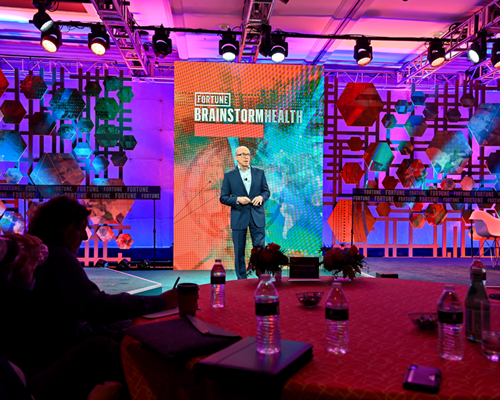Four key takeaways emerged from on the ground:
1. Women’s health issues and the gender workforce gap were front and center. Panelists discussed the World Economic Forum’s (WEF) recent Global Gender Gap report, which looks at multiple metrics of equity, including health, income, education and political participation. WEF’s report found that women and girls have slipped backward 39 years on these metrics as a result of the pandemic – a powerful albeit disheartening statistic. It was compelling to hear from women’s health leaders such as Maven Clinic CEO Kate Ryder and Carrot Fertility CEO Tammy Sun about what they’re doing to be part of the solution, such as providing more streamlined access to fertility specialists and reducing treatment costs. Sun discussed how supply-and-demand and access issues drive up the cost of fertility healthcare. The US is currently graduating one fertility specialist physician for every 11 million Americans every year. Founder and CEO of Inception Fertility TJ Farnsworth noted that his company is working to address this gap by using technology and new care models to try and extend physicians’ capacity – not just in major urban areas, but in cities and towns that may lack fertility care centers.
2. The pandemic positively accelerated the healthcare landscape in some areas; in others, we seem to still be facing the same problems. On the positive side, lessons we’ve learned from fighting COVID-19 could help in the fight against other diseases. As Pfizer CEO Dr. Albert Bourla explained, “In the next five or ten years, we should see dramatic improvements in cancer, based on the research. . . . We may be able to use mRNA, not to recognize a virus, but to recognize a cancer cell and attack it.” Panelists agreed that we still lag in data sharing, despite the benefits seen during the pandemic. However, industry leaders think we’re on the cusp of change, where we could shift from a reactive, symptoms-treating model to one where AI and technology are helping us gather longitudinal data that’s contextualized. In other words, technology would allow doctors to proactively reach out to patients instead of patients having to initiate their own care. That might seem like a paradigm shift that’s many years away, but healthcare leaders believe it's not as far off as we think.
3. The topic of wearables and connected health provoked the most debate on stage. In five to seven years, industry leaders expect that the healthcare landscape will be ‘digital first,’ but we’re not there yet. Even in a room where the new sleep-tracking rings abounded, some health tech experts feel that the public isn’t quite ready to harness the tremendous potential of these devices and others. “You need an operating system of healthcare . . . that will let you take these ‘useless’ things called wearables and attach them to your doctors and to other data, to bring your healthcare to life,” said Adrian Aoun, CEO of Forward, an AI-based healthcare system connecting private doctors with technology to enable data-driven primary care. Aoun raised thought-provoking questions, noting that if we want these devices to be as useful as possible, we need doctors and tech systems to help people decipher what it all means. Experts challenged the tech industry to package the vast amounts of data from wearables in a way that’s more user-centric and supports patient behavior changes. Conversation throughout the conference was highly focused on the need to shift to a preventative care model, and many saw wearables as one path in making this transition possible.
4. The mix of industry perspectives in the room made the dialogue dynamic. A comment from Arianna Huffington was repeated as somewhat of a mantra throughout the conference: In the post-COVID landscape, “every business is now a healthcare business.” Companies such as Delta Air Lines and Marriott may not have previously been at a healthcare conference just a few years earlier. But with massive workforces and business models that were deeply rattled by the pandemic, companies of this scale were forced to confront these challenges head on. This dynamic made the perspective mix in the room even more diverse and nuanced.
Despite the challenges we still face with respect to the pandemic, the overall air of the conference was one of optimism – and it certainly didn’t hurt that we were able to say our goodbyes together in-person instead of waving across a Zoom screen. It was inspiring to be with a group who is deeply engaged in transforming the field of healthcare and actively taking on learnings from the past few years to incite positive change.

